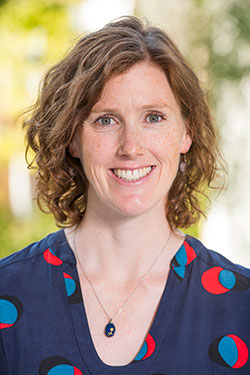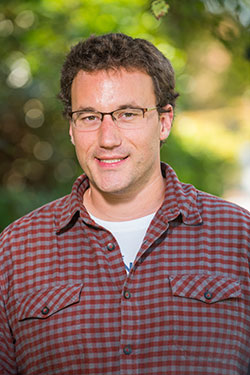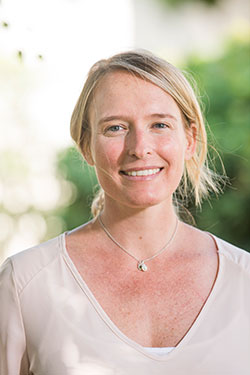Humboldt State University faculty members Environmental Science & Management Professor Kerry Byrne; Biology Professor John Steele; Forestry Professor Lucy Kerhoulas have been selected as recipients of the 2019 McCrone Promising Faculty Scholars Award. Selected for exhibiting potential in a specific field, each faculty member will receive $1,500 to assist a program of creative activity, scholarship, or research. In addition, Christopher Ramponi won the Alistair and Judith McCrone Graduate Fellowship, which is given to graduate students who have demonstrated strong potential in their field.
The awards honor HSU President Alistair McCrone and recognize the accomplishments of HSU’s excellent newer faculty members and students.
###

Environmental Science & Management Professor Kerry Byrne is an impressive and active scholar. A terrestrial ecologist, her research centers around the abiotic and biotic factors that affect the management and restoration of species, communities, and ecosystems. Her current research projects include assessing the efficacy of a new restoration technique to eradicate exotic species and encourage the growth of native species at the Lanphere dunes; a conservation study of a rare plant species in southern Oregon; and a rainfall manipulation experiment to assess ecosystem response to global climate change in the western Great Basin.
She has been an author on more than 10 publications—including two peer-reviewed journal articles that have been published since she arrived at HSU in 2017—and her work has been cited numerous times. She has also actively sought and received funding to support her research endeavors. Since 2017, she has won four competitive grants totaling $112,295 and has been awarded 12 research grants since 2014, including ones that support student research opportunities.
Involving students is a central component of her research, as well. She includes undergraduate and graduate students in many aspects of her research through fieldwork, lab work, analysis, and writing. In teaching the lecture and lab section of Applied Natural History and Ecology (ESM 303), she frequently uses her research to demonstrate ecological concepts or to show a case study of ecological research related to course material.
“I am excited to work with motivated undergraduate and graduate students on independent research projects and I strive to create paid research opportunities for students in all of my research endeavors,” she says.
###

Biology Professor John Steele joined HSU in 2016 and has already become a leader in the department. As a neuroscientist and stem cell biologist, his research explores cellular pathways that human neurons access to survive injury, and what happens when these pathways break down in neurodegenerative diseases. His research program combines two cutting-edge technologies: human-induced pluripotent stem cell culture and CRISPR-based gene editing. These methods allow members of the Steele lab to edit, engineer, or regulate any gene in the human genome to answer complex questions about the pathogenesis of rare and common human neurodegenerative diseases.
His lab provides training opportunities for about 25 undergraduate and graduate students each semester. He teaches students in his lab highly complex experiments and helps them interpret their data, prepare presentations, and grow as independent scientists.
He excels not only as a scientist but also as a teacher, which shows in and outside the classroom. One nominator notes: “HSU students love Steele. Both his lower division and upper division courses are very popular and routinely fill up and have wait lists (the word has gotten around).”
He secured a major research grant of $100,000 from the CurePSP Foundation and several smaller grants. He has obtained summer research stipends or travel funding for over a dozen of his students. He’s also devoted to serving the University in various ways. He’s club advisor to the Biological Sciences Graduate Students’ Association, Chair of the GEAR Curriculum and Assessment Committee, a faculty mentor to INRSEP students and is actively involved in the Society for the Advancement of Chicanos/Hispanics and Native Americans in Science (SACNAS).
###

Forestry Professor Lucy Kerhoulas’s work on restoration, tree physiology and old-growth canopy ecology is regionally focused and reflects HSU’s commitment to environmental sustainability.
She is currently involved with multiple ongoing scientific investigations, illustrating an impressive breadth of research interests and a strong capacity to work collaboratively with others. Two of the projects she is leading are especially notable. One study based in Redwood National Park evaluates forest vigor and biodiversity across sites thinned from 1978 to 2017. The second study examines the influences of conifer encroachment and removal on ecosystem vigor and biodiversity in California oak woodlands.
Her research is relevant, timely, and important not only to academics but also to conservationists and the timber industry. Her projects capture people’s imaginations and she conveys both the scientific complexity of her work and its real-world importance.
She’s just as committed to teaching as she is to forestry science, building successful and student-oriented research. She works closely with undergraduate and graduate students and treats them as colleagues and collaborators. Many top Forestry students who have worked with her have gone on to become her graduate students.
“As a scientist and professor, I strive to pursue meaningful and inspiring ecological
questions, follow the scientific method to produce informative deliverables that will improve human land stewardship, foster positive relationships among academia, industry, and environmental groups, and share my enthusiasm for science and nature with my students in a hopefully contagious way,” Kerhoulas says.
###
The first in his family to go to college, Christopher Ramponi, winner of the Alistair and Judith McCrone Graduate Fellowship, excelled as an undergraduate English major at HSU and continues to stand out as a graduate student in Applied English Studies.
Often described as thoughtful, motivated, and passionate, he is well-versed in a broad range of contemporary critical thought, especially in issues of identity and representation. The scope of his research includes exploring the genealogy of tropes of literary romanticism—“tragic love,” in particular—to understand why they continue to have a hold on society today.
A sharp and a passionate thinker, he is neither dogmatic nor intimidating. “He is an eager and open-minded learner, and his fellow students find him supportive, self-deprecating, and funny,” says one nominator.
Professors note his consistently insightful critical or theoretical perspectives and how he voices objections and critiques amiably and tactfully. His contributions to his seminars are focused and astute—models of critical acumen and inquiry. His keen and subtle mind, his work ethic, his capacity for self-directed research, and his confident “ownership” of his scholarly and intellectual development make him an exceptional student.
His successes are rooted in a deep appreciation of literature. “Literature opened a world to me that I had previously thought closed to me by my background—that of a son of practical, work-centered immigrant parents whose academic lives were forcibly cut short after the eighth grade,” he says. “Literature didn’t offer me a ready answer as to how I could change this, but through it, I was getting something more valuable: I was being taught to question, to critique, to evaluate. I was being taught not to blindly accept my condition because my condition was contingent on factors that could be changed.”